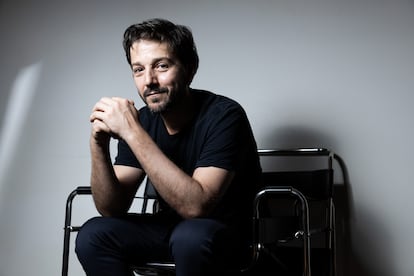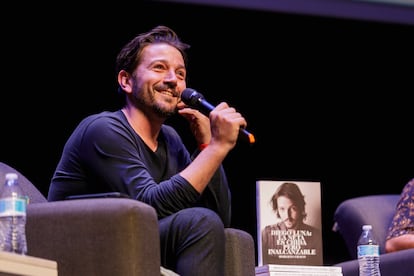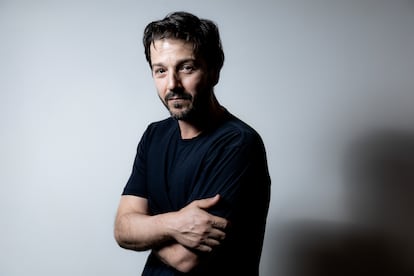Diego Luna: ‘If you don’t feed life offstage, you’ll be all alone with your films’
The Mexican actor spoke with EL PAÍS about his professional life, from his beginnings in the theater to his rise as an international figure


Diego Luna grew up in a setting like the one he found himself in a few days ago, at the Santander Performing Arts Complex, in Guadalajara, Mexico. Everything in his life always seems to bring him back to acting… but more precisely, to the theater. He’s the son of a renowned architect and set designer — Alejandro Luna Ledesma — and, from a young age, he accompanied his dad. With him, he visited the National Institute of Fine Arts and Literature, the National Autonomous University of Mexico (UNAM) and performing arts centers in Guadalajara, Monterrey and Tijuana. Young Diego got to see “all the theater [possible], without being asked,” he jokes.
“I saw how theater was done [from the perspective of] what happened on the stage, when [the audience] arrived, sat down and left. That life enveloped me to the point of returning here,” he reflected, in front of those attending the Guadalajara International Film Festival.
Luna — one of the most recognized actors of his generation, both in Mexico and internationally — received the attention and affection of a packed forum, with more than 1,000 people present. He spoke on a stage that, curiously, his father helped design. It was difficult for him to hold back his emotions: he took a selfie for his partner and children, with the audience behind him.
“Very few people know what it looks like from [the stage], especially when there’s an audience. It’s really cool,” he noted.
Over the course of a few days in the capital of the state of Jalisco, a flurry of activities revolved around him. There were screenings of the films and TV series that he has starred in, directed and produced. All of this took place within the framework of the 39th Guadalajara International Film Festival, which concluded this past Saturday. Luna’s 30-year-career was honored with the Mayahuel Honorary Award.
As part of the recognitions and activities, the actor also presented a book about his life, which was authored by director Roberto Fiesco. It’s a frank and generous testimony of Luna’s professional journey, from his beginnings in the theater and his time on television, up until his rise as a figure in global cinema.
Luna, 44, was born in Toluca, a city about an hour east of Mexico City. He tells EL PAÍS that his eight sessions with Fiesco felt more like “therapy,” because they helped him remember his life, find some clarity and make his memories properly fit together, so that they “sound more poetic.” He describes the exercise of recounting his experiences from the age of three to the present moment as “very nice,” but also difficult, because he had to do it in the aftermath of his father’s death. Alejandro Luna passed away at the end of 2022.
Shortly before the festival ended, Luna spoke to EL PAÍS via videoconference. Returning to the process of the book, the actor delves into what memory means. “Suddenly, I realized many things, many patterns… things I didn’t say, things I saw, [things] that I didn’t treasure as I would have liked. I realized that [Fiesco] was telling my story in a very convenient way: there were things that he decided to ignore, or that he decided to put in a different order. He brought back memories, images. He reminded me of fundamental relationships in my life, because sometimes, memory betrays you.”
During his adolescence, Luna spent time on television, where he was part of important soap operas, such as El Abuelo y Yo (1991) and El Premio Mayor (1995), translated respectively as “Grandpa and Me” and “The Jackpot.” He doesn’t deny this part of his career, because he feels that it was crucial for him to find his way.
“It was important to be able to transcend that stage. I had to go through it to realize what I realized. At 19-years-old, I said to myself: ‘I’m never going to watch a soap opera again.’ I owe a lot of that to the theater, which kept me interested, but above all to cinema, which taught me that there was an opportunity to make audiovisual productions in a much more artisanal way, using much more time. I needed to play those [soap opera] characters to wake up and get out of there. Without a doubt, [Mexican filmmaker] Alfonso Cuarón was vital,” Luna emphasizes.

The actor refers to what he considers to have been a turning point in his career: being able to work with Cuarón in Y Tu Mamá También (2001) — Your mother as well — which was the director’s third feature film. Starring alongside fellow Mexican actor Gael García Bernal and the Spanish actress Maribel Verdú, it’s a road trip movie about two young men. They embark on a journey of self-discovery, traveling to the beach with a woman. In the film, the director seeks to reflect — through sexual desire and intimacy — the social, political, ideological and economic problems of contemporary Mexican society.
The movie won the award for Best Screenplay at the Venice International Film Festival. Luna and García Bernal both shared the Marcello Mastroianni Award, which recognizes emerging actors. Y Tu Mamá También also earned an Oscar nomination in the Best Original Screenplay category. The film was commercially successful and is considered to be an icon of what’s known as “new Mexican cinema.”
“Without a doubt, [the movie] was a breakthrough,” Luna agrees. “It’s hard for me to say that, because many very important things have happened in my professional life, which I consider to be pivotal moments. But I think that, with Y Tu Mamá También, I also grew up in many ways. I decided to take on new challenges, change directions… [I connected] with people who’ve been very important in my life and key in making decisions in my professional and personal life. Because, personally, very important things also happened to me in that film,” Luna adds.

Film as a social tool
This professional commitment opened the doors to the international market. Beyond Mexico, Luna has appeared in more than 30 films produced in Spain, the United States, the United Kingdom and Germany, working with directors such as Steven Spielberg and Gus van Sant. He’s also made the leap to popular sagas, as the spy Cassian Andor in Star Wars and as drug lord Miguel Ángel Félix Gallardo in Narcos: Mexico. However, even with this acting range in film and television, Luna continues to see the theater as his “safe place.” This is thanks to his father and the prestigious playwright Luis de Tavira, who invited him to be part of a play at the age of nine.
“When I think about home, about my center — about that place where I want to be — the theater is the first thing that comes to mind, without a doubt. But not only as an actor: also as a member of the audience. I love cinema, I’m going to continue doing it — and I also believe in cinema as a very powerful tool,” he clarifies. “But theater is where I always return.”
Luna has been nominated for a Golden Globe and a Goya. He’s also won an Ariel Award — given annually by the Mexican Academy of Cinematographic Arts and Sciences (AMACC) — for Best Script. This was for Abel (2010), his second film as a director. And, alongside García Bernal — his friend, acting partner and colleague — he has engaged in social works.
Whether as founders of the Ambulante Documentary Film Festival — a space for documentary films as tools for cultural and social transformation in Mexico and Central America — or as producers interested in making sensitive issues part of the public agenda, they’ve been committed to social change.
Recently, at the Guadalajara International Film Festival, their documentary — State of Silence (2024) — premiered. It touches on the endangered state of press freedom in Mexico. Luna and García Bernal made it through their production company, La Corriente del Golfo (The Gulf Stream).
Luna is a firm believer in that, if cinema doesn’t function as a mirror and if it doesn’t connect with the deepest part of our context — who we are and our life within a community — “it has no meaning.”
“That’s why it exists,” he affirms. “This is how I learned to see it and this is how I learned to do it. I never saw my dad working on a play that talked about something he didn’t care about. What I feel in this country (Mexico) I haven’t felt in another. Here, I’ve felt the deepest level of connection I’ve ever had with other human beings and with my community. I’ll always respect that and I’ll nourish it throughout my life, to whatever extent possible. I feel that cinema is a great tool for that. It would be a waste, a shame, to have the freedom to make films and make one that doesn’t matter,” he says.
Luna feels happy about how cinema has progressed in the creation of spaces such as the Guadalajara Film Festival, allowing people to connect through stories that matter, in whichever country or region they’re in. He says that he feels “proud” to be part of a community and a moment in which cinema has somehow found audiences and forums to have dialogue.
“I’m part of a moment in which cinema has connected with the public in a very harmonious way. When I grew up as a spectator, we didn’t have access to a cinema that told us about the different realities in Mexico. I grew up watching mostly foreign films.”
Luna is grateful for what he has achieved and for the intensity with which he has worked for more than 30 years. But he’s also aware of how difficult it is to always be living out of a suitcase and to “be addicted to being away.” Luna’s assessment of his profession is that it’s important not to forget that life doesn’t only happen onstage or in the stories that are told. In the end, what he makes are just films.
“Life is also about other things, other connections. It’s about another legacy. If that part of you isn’t fed, then you’ll be all alone with your films. I don’t want that to happen to me,” he concludes.
Translated by Avik Jain Chatlani.
Sign up for our weekly newsletter to get more English-language news coverage from EL PAÍS USA Edition
Tu suscripción se está usando en otro dispositivo
¿Quieres añadir otro usuario a tu suscripción?
Si continúas leyendo en este dispositivo, no se podrá leer en el otro.
FlechaTu suscripción se está usando en otro dispositivo y solo puedes acceder a EL PAÍS desde un dispositivo a la vez.
Si quieres compartir tu cuenta, cambia tu suscripción a la modalidad Premium, así podrás añadir otro usuario. Cada uno accederá con su propia cuenta de email, lo que os permitirá personalizar vuestra experiencia en EL PAÍS.
¿Tienes una suscripción de empresa? Accede aquí para contratar más cuentas.
En el caso de no saber quién está usando tu cuenta, te recomendamos cambiar tu contraseña aquí.
Si decides continuar compartiendo tu cuenta, este mensaje se mostrará en tu dispositivo y en el de la otra persona que está usando tu cuenta de forma indefinida, afectando a tu experiencia de lectura. Puedes consultar aquí los términos y condiciones de la suscripción digital.








































